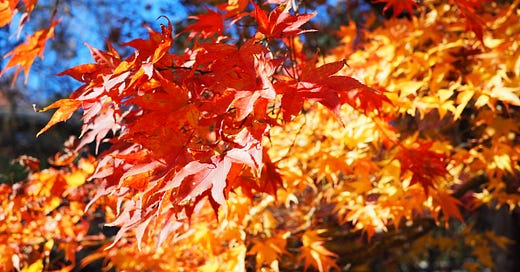I dug up the last withered remains of my garden at the beginning of the month, and I’ve taken down my hammock. I must confess the approach of winter has me feeling rather melancholy. I keep thinking of the poem “No!” by Thomas Hood…
No shade, no shine, no butterflies, no bees,
No fruits, no flowers, no leaves, no birds,
November!
The beautiful, jewel-toned leaves linger for so brief a moment every year, I never feel like I have the chance to appreciate them properly. I’m still figuring out what it means to appreciate them properly, how best to accomplish such a thing, when they’ve all blown away, leaving only the last, lonely lingerers rattling in the wind.
But I’m trying to follow the wisdom of the trees. These sovereigns of autumn scatter their largesse with so generous and careless a hand, undaunted by the prospect of waiting patiently through a long, cold winter with bare and empty branches. After all, there’s something clean and quiet and refreshing about winter. I shared the poem “The Busy Heart” by Rupert Brooke on Instagram recently, and it’s still been coming frequently to mind…
Now that we've done our best and worst, and parted,
I would fill my mind with thoughts that will not rend.
(O heart, I do not dare go empty-hearted)
I'll think of Love in books, Love without end;
Women with child, content; and old men sleeping;
And wet strong ploughlands, scarred for certain grain;
And babes that weep, and so forget their weeping;
And the young heavens, forgetful after rain;
And evening hush, broken by homing wings;
And Song's nobility, and Wisdom holy,
That live, we dead. I would think of a thousand things,
Lovely and durable, and taste them slowly,
One after one, like tasting a sweet food.
I have need to busy my heart with quietude.
“Quietude” is a beautiful word and a beautiful goal. And this line: “I would fill my mind with thoughts that will not rend.” My mind is too apt to get caught in a spiral of “rending” thoughts and anxieties, but that line helps me to remember to get off the merry-go-round and seek out nourishing thoughts like those Brooke lists, the simple things that don’t change.
I came across that poem very serendipitously: God left it where I couldn’t miss it. I happened to be back on campus at my alma mater recently and one favorite haunt that I revisited was the Jane Austen shelf at the library. To my surprise, Emma, Lizzie, Anne, Fanny, Elinor, Catherine and all the others had been moved (they now have a much better view out the window), and the section where they used to reside is now occupied by poets. There were two books that grabbed my eye right away…
The Week-End Book: A Sociable Anthology was originally published by Nonesuch Press in the 1920s. It is a collection of poems, songs and anecdotes designed to help you have a lovely weekend, doesn’t that sound like a wonderful concept? Rupert Brooke’s wonderful piece stood out to me as I was paging through, as did “The Leaden Echo and the Golden Echo” by Gerard Manley Hopkins…
…Resign them, sign them, seal them, send them, motion them with breath,
And with sighs soaring, soaring síghs deliver
Them; beauty-in-the-ghost, deliver it, early now, long before death
Give beauty back, beauty, beauty, beauty, back to God, beauty’s self and beauty’s giver.
See; not a hair is, not an eyelash, not the least lash lost; every hair
Is, hair of the head, numbered…
…O then, weary then whý should we tread? O why are we so
haggard at the heart, so care-coiled, care-killed, so fagged,
so fashed, so cogged, so cumbered,
When the thing we freely fórfeit is kept with fonder a care,
Fonder a care kept than we could have kept it, kept
Far with fonder a care (and we, we should have lost it) finer, fonder
A care kept. Where kept? Do but tell us where kept, where.–
Yonder.–What high as that! We follow, now we follow.–
Yonder, yes yonder, yonder,
Yonder.
The trees know that beauty, forfeited freely and given gladly back to God, is preserved and “kept with far fonder a care” than we could keep it ourselves. We follow it, and will reach it “as high as that” in the end.







Beautiful ruminations, Emma. ♥️
Emma, thank you so much for sharing these thoughts. I love both poems, and I feel the clarion call of quietude too.